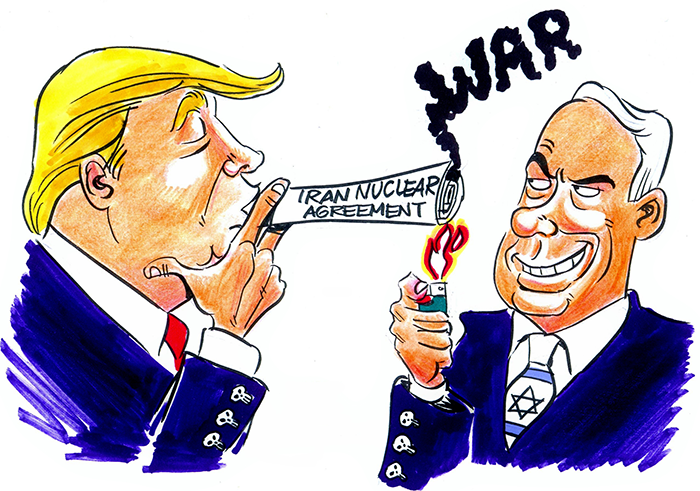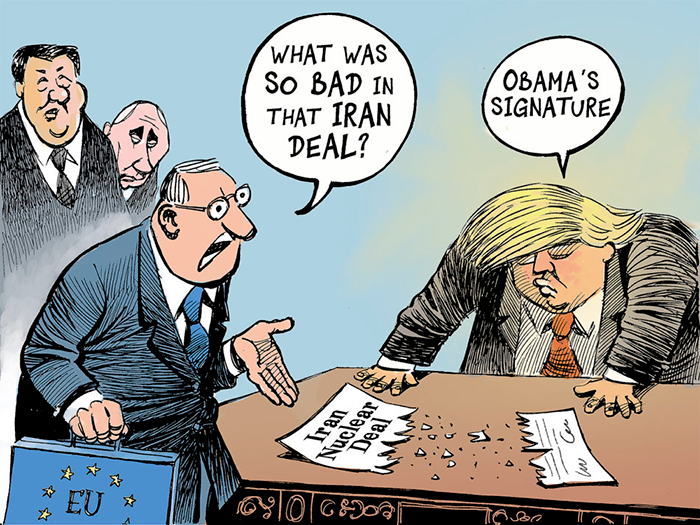



 Zafar Bangash
Zafar BangashLast month when Iran scaled back its commitment to limit uranium enrichment, from 3.67 % to around 4.5%, the Western corporate-owned media went into frenzy. Taking a cue from their political and corporate masters, they thundered: Iran cannot be allowed to have a “nuclear bomb.”
But Iran is not building a bomb and it has no intention of doing so. This is what the Rahbar, Imam Seyyed Ali Khamenei has said repeatedly and even issued a fatwa about its prohibition. So why do Western officials and media outlets continue to indulge in this vile propaganda?
Since Western, primarily US, policy against Iran cannot be justified, they have to resort to lies. This is meant to mislead the gullible American public that is fed up of endless wars and wants resources to be allocated to social programs. In May 2018, when Donald Trump announced repudiation of the agreement, he said it was a “bad deal” and wanted to renegotiate it to include Iran’s missile program as well as other defensive capabilities. The real reason, as we now know through the leaked cables of ex-British Ambassador Kim Darroch is that credit for this went to former President Barack Obama. Trump simply could not stomach that!
The Joint Comprehensive Plan of Action (JCPOA), as it is officially called, is not about Iran’s defence capabilities and Tehran would under no circumstances put itself at the nonexistent mercies of predatory powers like the US. Unfortunately, the world is not governed by the rule of law but by the dictum, “might is right.”
Weakness only invites trouble. Not surprisingly, Iran is not prepared to accept any demands from any party that would limit its ability to defend itself. Washington’s demands have now escalated to “Iran must not have a nuclear bomb!”
The latest allegations intensified after Trump unilaterally repudiated the July 2015 nuclear deal. Islamic Iran and six other countries — Russia, China, France, Britain, the US and Germany — had signed the agreement. The European Union (EU) was also party to the negotiations (collectively called the E3/EU+3). The negotiations lasted several years.
The word Joint should be noted. It is not a bilateral agreement between the US and Iran. It is a multilateral agreement and all signatories must abide by it.

The JCPOA states that in return for Tehran accepting limits on its nuclear program (although permitted under the nuclear Non-proliferation Treaty – NPT), and allowing intrusive IAEA inspections, the other signatories agree to lift all nuclear related sanctions. UN Security Council resolution 2231 (July 20, 2015) endorsed the agreement and officially ended all UN sanctions against Iran (for the record, only the Security Council can impose sanctions on a country. US sanctions have no validity in international law; it is gangsterism!).
Trump’s repudiation of the agreement and imposition of sanctions against Iran violate article viii of the “Preamble and General Provisions” of the JCPOA, that states, inter alia, “The E3/EU+3 and Iran commit to implement this JCPOA in good faith and in a constructive atmosphere, based on mutual respect, and to refrain from any action inconsistent with the letter, spirit, and intent of this JCPOA that would undermine its successful implementation. The E3/EU+3 will refrain from imposing discriminatory regulatory and procedural requirements in lieu of the sanctions and restrictive measures covered by this JCPOA…”
Thus, far from imposing new sanctions, article viii of the preamble prohibits even “imposing discriminatory regulatory and procedural requirements” against Iran. It needs emphasizing that the US is a state party to this agreement. It was not signed with a particular US regime (Obama’s), contrary to assertions by some US officials that Trump has no obligation to abide by it. Agreements are signed with states, not a particular government or regime otherwise there would be no international agreements at all.
Despite the fact that Trump walked away from the JCPOA in May 2018 and imposed a raft of illegal sanctions, the Islamic Republic waited for an entire year to see whether the other signatories would come up with mechanisms to ensure Iran’s rights under the agreement are respected. On May 8, 2019, Iranian President Hassan Rouhani notified the remaining signatories in the JCPOA and gave them a 60-day notice to come up with a mechanism whereby Iran would be able to continue to trade and sell its oil. Failing to do so would leave Tehran with no choice but to scale back its compliance on uranium enrichment.
In an interview with the New York Times (published July 4), Iran’s Foreign Minister Dr. Mohammad Javad Zarif said Iran “will remain committed to the deal as long as the remaining participants (EU, France, Germany, UK, Russia and China) observe the deal.” He went on, “Survival or collapse of the JCPOA depends on the ability and willingness of all parties to invest in this undertaking. In a nutshell, a multilateral agreement cannot be implemented unilaterally.”
He also pointed out that Iran’s decision to reduce its commitments was based on its legal rights under paragraphs 26 and 36 of the nuclear deal, saying, “Paragraph 36 of JCPOA is a clear example that we negotiated this deal with the full understanding that we could not trust the commitment of the West.”

As soon as Iran scaled back its commitment, the European trio — France, Britain, and Germany — started accusing Iran of being in “breach” of the JCPOA. They totally ignored the fact that it was the US that had violated the deal that has led to the current crisis. Both Russia and China — the other signatories — supported Iran’s position despite saying they regretted its decision to increase enrichment. The Chinese went on to say that Washington was responsible for the impasse and insisted it must comply with the JCPOA.
Following the ministerial meeting of the Organization for Security and Cooperation in Europe on July 9, Russian Foreign Minister Sergey Lavrov was asked about the Iran nuclear deal. He replied, “The situation is paradoxical. The United States has pulled out of the JCPOA and does not comply with the UNSC resolution, but at the same time it prohibits the other parties to honor this resolution while pointing the finger at Iran.”
He also exposed American and Zionist hypocrisy over the issue, “One more thing: when the White House and the State Department demand that Iran honor its commitments under the JCPOA, and when Israeli Prime Minister Benjamin Netanyahu demands, as he did the day before yesterday [July 7], that the EU punish Iran for violating the JCPOA, this logically implies that the United States and Israel should recognize the legitimacy of the JCPOA. However, they recognize its legitimacy only in the current situation, when problems with the JCPOA can be used to mount pressure on Iran.
“It is not a wise approach. We are in favor of a search for solutions. We know very well who stands behind aggravating the confrontation. So far, there has been no investigation into the provocation concerning oil tankers. We do not see any way out of this situation other than demanding that all JCPOA signatories resume compliance with their commitments and the basic principles of the JCPOA. I do not see any other way” (Mid.ru, July 9, 2019).
On June 28, the European trio plus Russia and China met in Vienna to announce activation of INSTEX (Instrument in Support of Trade Exchange) with Iran. The Europeans put in a couple of million euros into the scheme and said it would cover Iran’s purchases of medicines and food items.
In gestation since first announced last January, INSTEX has fallen far short of Iran’s legitimate expectations. “It was a step forward, but it is still not enough and not meeting Iran’s expectations,” said Iran’s Deputy Foreign Minister Abbas Araqchi after four hours of talks in Vienna.
Foreign Minister Zarif was more explicit. He said INSTEX was just a prelude to the implementation of 11 commitments the Europeans have undertaken to save the JCPOA. These included Iran’s oil sales to Europe, secure financial returns from the sales and investment in Iran, as well as facilitation of transport, aviation, and shipping activities involving the country. Under INSTEX, no money will be exchanged. In return for Iranian oil, Europe will supply goods to Iran.
These are not favors to Iran but Europe’s obligations under the JCPOA. Both Russia and China have rejected US unilateral sanctions on Iran. At the G20 summit in Osaka, Japan (June 29), while meeting Chinese President Xi Jinping, Trump announced a waiver for China’s import of Iranian oil to meet its energy needs. Beijing had already said it would not accept American extraterritoriality over international trade and transactions.
The Europeans, however, are not acting in good faith. Britain in particular is acting as US poodle. On July 4, British marines boarded the Iranian oil tanker Grace 1 at the mouth of the Mediterranean Sea near Gibraltar. Britain said it took the action at the request of Gibraltar — a ludicrous claim since the latter is illegally occupied by Britain and is claimed by Spain. It alleged the tanker was taking oil to Syria that is under EU sanctions.
Iran rejected the allegation. Further, Iran is not a member of the EU and is not obliged to abide by European sanctions on Syria or anyone else. Iranian officials demanded the immediate release of the tanker, otherwise Tehran would take action against British tankers in the Persian Gulf. By July 13, the British had realized their folly undertaken at the behest of Washington and wanted to back out of the mess they had created.
In a telephone conversation with his British counterpart Jeremy Hunt, Dr. Zarif said that seizure of Grace 1 had been inspired by US sanctions on Iran. He said that Iran would continue to exhaust all avenues to export its oil despite the existing sanctions. “The Islamic Republic of Iran will continue its oil export under any circumstances,” said Dr. Zarif, according to an excerpt of the phone call with Hunt covered on the website of the Iranian Foreign Ministry. For his part, Hunt expressed hope that legal and judicial examinations in Gibraltar would lead to the immediate release of the tanker and its oil cargo.
The British foreign secretary admitted that Iran was entitled to its rights to export crude oil despite US sanctions, saying, however, that he was worried about escalated tensions in the Persian Gulf region where a series of military incidents over the past weeks have increased concerns about a potential conflict between Iran and the US.
If Hunt is sincere in his utterances, he should honor his commitments and end Britain’s role as America’s lapdog.
